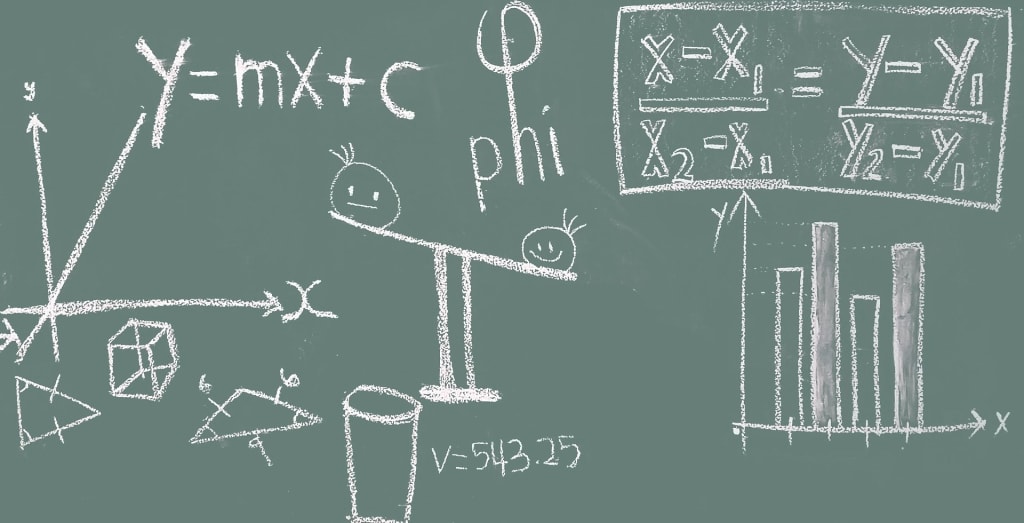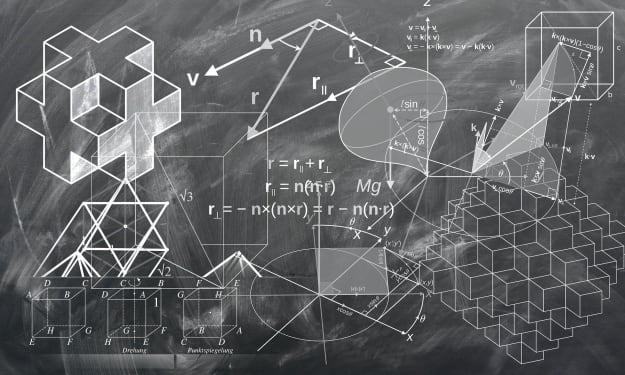You Don't Have to Be Good at Math to Be an Effective and Successful Research Scientist
A Big Education and Career Myth Busted

When I was a youngster and first expressed interest in pursuing a career in science I was told repeatedly that I was simply not good enough at math to make the cut. Grade level after grade level, teacher after teacher relayed the same disappointing news. It was great that I expressed interest in science, but that career path just wasn't for me. With a twenty five plus years career in research under my belt at this point I am pleased to inform all of those teachers and others who said the same, that they were dead wrong, but not so pleased at how damn old that makes me feel. I need to make one point crystal clear from the outset. Please, please, please do not take this article as an excuse to slack off in math or a reason for you not to study mathematics. If you want to be a research scientist, exposure to a strong math education is a must. I am most assuredly not saying or implying that math is not an important skill for a research scientist. What I am saying is that you do not need to be the second coming of John Nash, or top of your class, or even in the top half of your class in your math courses to be an effective research scientist. You can be average to below average in math and still be a kick ass researcher (in many fields but not all, see caveats below), or maybe even one of the best researchers in your field. I will leave it to others to say if I am "one of the best researchers in my field" however I can say I have had a very productive and successful career. I have been involved in major breakthroughs, developed and commercialized some successful products (and a few less than successful ones), published a host of papers and patents, presented at technical conferences around the world, and any other number of accomplishments that typically signify success for a researcher.
Without a doubt being good at math will make your life as a research scientist, much, much easier, in many ways. Conversely not being good at math will make your life much more difficult, and require you to develop compensating skills such as enhanced creativity, higher level verbal, language, and analytical abilities, and people skills. The people skills part is critically important as you will be forced to ask for help often. Therefore, you will need many colleagues and friends willing to help when you do ask. That can be a tall order in research, especially in the academic environment, where the every man for himself attitude still dominates. And the sad fact of the matter is that you may never even get a shot at a quality graduate education because standardized testing (particularly of the pre-graduate school variety) puts a premium on mathematics and a poor score there can sink your chances of winning entry to many graduate programs. Even if you ace the verbal/language/analytical sections, like I did, if you have poor math scores, like I did, you will end up in a less than top rated graduate school/program, just like I did. That said, many very high quality research scientists emerge from less than highly rated graduate programs in the sciences every year.
As I mentioned above there are some important caveats to keep in mind. First and foremost this does not apply to all sciences but probably more than most people would think. Many of the so called hard sciences such as experimental or theoretical physics obviously do require a significant amount of higher level math skill. It is hard to imagine thriving in either of those fields without that talent so much of my commentary would obviously not apply, though even so I would wager it is easier today than it has ever been to make it in the "hard sciences" for the computationally challenged. We can thank our machines for this as much of the heavy lifting of math can be offloaded to computers these days.
Just as importantly, math knowledge is a hard requirement. Significant knowledge of math is still required even if being good at it is not. What do I mean by that statement? You will absolutely need to know when math should be deployed to solve a particular problem and even what type of math may be needed. You do not however, need to know how to actually use that math yourself. Fortunately, there will always be someone somewhere who will know how to do that and will be willing to help you if you take my advice from above and develop strong people skills. Failing that computers can do much of the hard work of math for you. The internet has a plethora of resources for the math challenged like myself. But, you must know what you are looking for which is another reason familiarity with and knowledge of math, including higher level maths like calculus is a hard requirement. Many will no doubt question the distinction between "knowledge" of math and mathematical ability. It is possible to argue that they are one and the same. After all how can one 'know' math without having the ability to use it to solve mathematical problems. This is a difficult question and one that philosophers of mathematics and logic have struggled with for a very long time. Like most problems of this type, no final answer has been forthcoming, and there may be no 'final' answer. Either, you believe, as I do, that those two things are different, or you do not. I can only speak from my own personal experience of being generally terrible at solving math problems, but for the most part "knowing" how to use and deploy math, and the correct sort of math, when it is needed. The only reason I 'know' this is because I was exposed to the various types of math throughout the course of my education in science.
About the Creator
Everyday Junglist
Practicing mage of the natural sciences (Ph.D. micro/mol bio), Thought middle manager, Everyday Junglist, Boulderer, Cat lover, No tie shoelace user, Humorist, Argan oil aficionado. Occasional LinkedIn & Facebook user






Comments
There are no comments for this story
Be the first to respond and start the conversation.